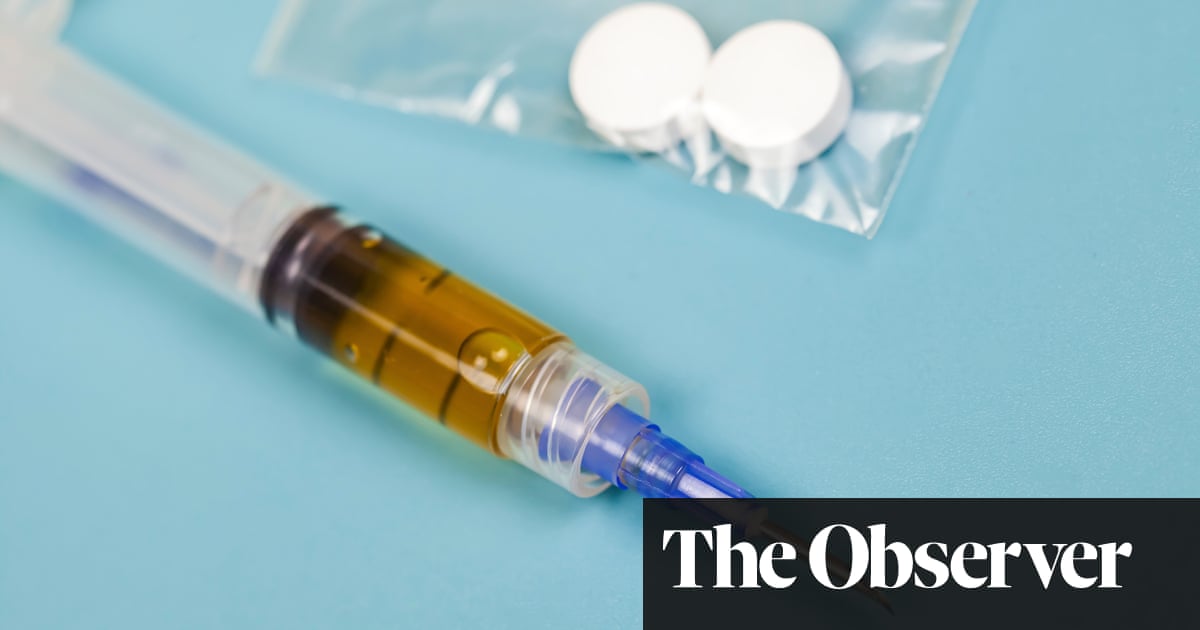
Ministers were warned nearly two years ago about the “significant public health threat” posed by synthetic opioids but delayed taking recommended steps to tackle rising deaths, the Observer can reveal.
In a report by the Advisory Council on the Misuse of Drugs, sent to the Home Office in July 2022, the government’s own advisers laid out concerns about the spread of the potent drugs in Britain and called for urgent action to protect people from “severe harm”.
The panel of 23 independent experts – including the medical director of a major London NHS trust and the head of drug threat at the National Crime Agency – cited official statistics showing that by October 2021 there had been 31 suspected heroin overdoses where nitazenes – a type of synthetic opioid – were present.
They said the figures were probably an “underestimate” and that the substances had also been detected in cocaine, illicit prescription tablets and vapes, posing a “serious acute health risk” akin to that from fentanyl.
The 2022 report called for 10 synthetic opioids to be controlled as class A drugs “as soon as possible” to “bring them into line with other potent opioids”, meaning the maximum sentence for making or supplying them would be life in prison. It also called for a generic definition of nitazenes to ensure any new variations would automatically be deemed class A, and raised concerns about inconsistencies in testing, calling for a national working group to be formed to set standards on postmortem testing, aimed at improving monitoring and preventing deaths.
But the report does not appear to have been treated as a priority in 2022, and went without a response for seven months. When the Home Office did respond in February 2023, it said it was sorry for the delay and that it accepted the report’s key recommendation to categorise key synthetic opioids as class A drugs, adding it would do so as soon as parliamentary time allowed. There was then a further nine-month delay before the amendments were laid before parliament.
It was not until last Wednesday that the stricter controls on the 10 synthetics named by the advisory council in 2022, and four others identified since, officially came into force.
The government said the new law showed ministers were “highly alert” to the threat from synthetic opioids. “We are not complacent,” the home secretary James Cleverly said.
A spokesperson said the changes would “help prevent drug-related deaths in the UK and ensure anyone caught supplying these substances faces tough penalties”, and said they showed ministers “have been taking a range of preventative action”.
But experts say the government has not been quick enough to implement such changes, or to track non-fatal overdoses. A member of the Advisory Council said it had been warning the government “for years” about the “huge threat” from synthetic opioids, including calling for improvements to testing. “I’m concerned about the lack of speed in terms of preparing for what’s to come,” they said.
Dr Mark Pucci, a Birmingham-based consultant in clinical toxicology, said the country was “now playing catch up”. He told the BBC: “I do believe England is behind the curve on this matter. The data collection method they are using in terms of testing drug paraphernalia is only ever going to be the tip of the iceberg.”
Since last summer, 101 deaths have been officially tied to synthetic opioids, according to the National Crime Agency, but the true figure is likely higher.
As well as being mixed with “hard” drugs such as heroin, synthetic opioids are increasingly being found in samples sold as prescription drugs, according to data from testing service Wedinos.
Last week, a stark warning came from US secretary of state Antony Blinken at a UN conference in Vienna about the danger posed by fentanyl and other synthetics.
David Caunter, head of the drugs unit at Interpol, which facilitates cooperation between police in 196 countries, told the Observer that synthetic opioids were being shipped “direct to consumer” from China to the UK and other destination countries. He said packages were often routed via other countries to disguise their place of origin and sent in small packages, making it “very challenging” for police to “connect those dots”.
“It’s almost like a ‘death by 1,000 cuts’ model. But when you look at the criminal networks behind it, you see that they are shipping hundreds of packages a week, if not thousands, and you realise that this is actually a very large-scale, transnational criminal organisation.”
The government did not comment on the reason for the delays in its response to the 2022 report, but said there had been an “intensive operational effort” to track down suppliers of synthetic opioids since they were first detected and that quantities reaching the UK “remain lower than other countries”.
It said that while not previously classified as class As, synthetic opioids were covered by other legislation, and that it was “seeking to stay ahead of the curve” by creating a generic definition for nitazenes so they were automatically covered in future. It also said it was enhancing its “early warning system”, which includes “analysing wastewater, tracking non-fatal overdose data and forensic and postmortem analysis”.
Dr David Bremner, medical director at the charity Turning Point, said the increase in synthetic opioids was a “huge concern”. Without sufficient action, including a uniform national approach to testing, he said he feared “catastrophic deaths”.
Ishmail Hassan, an outreach worker from the charity Coffee Afrik, which supports people experiencing addiction and homelessness in east London, said: “I don’t think we are prepared. The health service, police … they are not ready. Everyone needs to get together and come up with a solution.”
One person who is supported by the charity in Tower Hamlets said: “People are scared. There is a lot of dangerous stuff around. I know two people who overdosed the other day and they didn’t have a clue why.”












